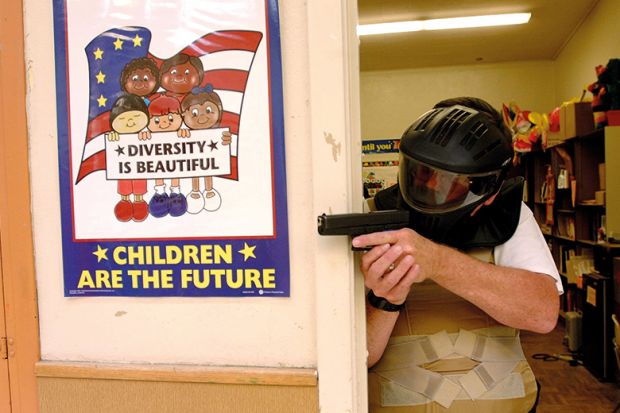As the US continues to reckon with a string of deaths of black Americans at the hands of law enforcement officers, attention is turning to a new focus: the institutions that train police, including universities.
Three states have announced reviews to consider how they can improve police requirements and standards, including Minnesota, where the killing of George Floyd when he was stopped by four police officers ignited worldwide protests.
Questions are mounting about the quality of education being provided by universities that train large numbers of police, considering that the Floyd case is only one in a litany of fatal encounters between police and black civilians.
“There’s some soul-searching going on because what people have begun to realise is how we as a discipline have become complicit,” said Jason Williams, assistant professor of justice studies at New Jersey’s Montclair State University.
Derek Chauvin, the former Minneapolis police officer who pressed his knee into Mr Floyd’s neck for nearly eight minutes and has been charged with second-degree murder, received a bachelor’s degree in law enforcement from a public university.
Given the job security of careers in law enforcement, nearly 300 US universities have police training programmes; they account for 45 per cent of police academies (the rest are run by law enforcement agencies) and two-year community colleges collectively graduate the largest number of recruits.
But critics complain that students in these programmes are predominantly taught by serving or former law enforcement officials, making them unlikely to change long-held practices, and that they focus more on firearms instruction than cultural diversity or bias.
The 45,000 police recruits per year, nationwide, spend an average of 168 hours apiece learning about defensive tactics, weapons and use of force, and 25 on report writing, versus 12 on cultural diversity and nine on conflict resolution, the federal Bureau of Justice Statistics reports.
“We train you like we train soldiers, and therein lies a fatal flaw in the training of a police officer,” said John DeCarlo, director of the master’s degree in criminal justice at the University of New Haven, speaking about police education in general. “Because soldiers have enemies and police officers have communities.”
The Minnesota State University system, which educates 86 per cent of that state’s police, is launching a task force that includes civilian advocacy groups to review the quality of its programmes and improve the diversity of faculty. The chancellor of California’s community colleges has also recommended an assessment of that system’s law enforcement training programmes, which produce 80 per cent of police there. And a commission in Virginia has been named to make sure that the police training programmes at its community colleges teach the skills required to deal with diverse populations.
Northeastern University started a police academy last year that requires each trainee to introduce him- or herself to a stranger every week and report back with the story of that person, and to practise peacefully resolving violent conflicts staged by actors.
As it stands, police “have very little training in how you speak to another human being”, said Bianca Harris, a former prison warden who is launching a new online master’s in criminal justice at North Carolina’s Meredith College this autumn that she said will teach graduates to treat civilians they encounter “like real people with real needs”.
The challenge is compounded by the fact that there are few national standards for police education, which is run by states. Minnesota is among the few states that require a university degree to become a police officer.
About half of officers nationwide have at least a two-year degree, 30 per cent have a bachelor’s degree and 5 per cent have postgraduate degrees, according to a survey conducted at California State University, Fullerton. While higher education is generally required for promotion, and most departments pay more to their personnel who have a degree, 82 per cent of police departments don’t require any university degree at all for officers just starting out.
Some police chiefs say demanding more education would discourage qualified applicants – especially racial minorities, who have lower university-going rates.
Training programmes also argue that they need their instructors to include people who come from law enforcement. Faculty who don’t, said Ms Harris, “may never have participated in the practical aspects of the things they’re teaching, and that’s a gap”.
And even the strongest advocates for heightened education among police concede that it can get diluted once trainees are on the beat.
“When a cop gets into the locker room, a culture takes over,” said Dr DeCarlo, a former police chief. “It’s a brotherhood, and very often that culture is very militarised.”
Education, said Satasha Green-Stephen, associate vice-chancellor at Minnesota State, “is just one piece of the puzzle”.
There is some optimism that things are changing. A friend of Dr Williams just got a joint faculty appointment in criminal justice and African American studies, for example.
One thing is certain, said Mona Danner, who chairs the department of sociology and criminal justice at Virginia’s Old Dominion University: “There’s an increasing recognition that the current situation is untenable and change must occur.”
If it doesn’t, Dr Williams said, “The consequences are deadly.”
后记
Print headline: US police killings put training in spotlight





